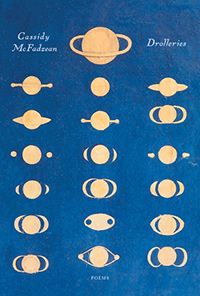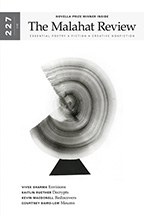Reviews
Poetry Review by Catherine Owen
Cassidy McFadzean, Drolleries (Toronto: McClelland & Stewart, 2019). Paperbound, 96 pp., $19.95.
 “We want to be stranger than what we are.” Cassidy McFadzean’s second book, Drolleries, draws on a panoply of artistic, occult, and natural symbologies to enter personal pain through acts of detachment and transmutation. The hybrids she invokes aren’t only the monstrous animal-human ones of the title but fusions of the classical and the contemporary, the drawing close-pushing away intensities of a relationship split that, in the end, has no cut and dried edges, and representations of nature versus the real green world itself. Rather than (mostly) dealing directly with the unravellings of identity that a divorce can create, especially when a marriage is undertaken in one’s still-formative years, McFadzean travels and looks at things. She enacts rituals and, through these, is able to translate angst. The tone is frequently cool, aloof. As a reader, one enters only slowly and without much emotion.
“We want to be stranger than what we are.” Cassidy McFadzean’s second book, Drolleries, draws on a panoply of artistic, occult, and natural symbologies to enter personal pain through acts of detachment and transmutation. The hybrids she invokes aren’t only the monstrous animal-human ones of the title but fusions of the classical and the contemporary, the drawing close-pushing away intensities of a relationship split that, in the end, has no cut and dried edges, and representations of nature versus the real green world itself. Rather than (mostly) dealing directly with the unravellings of identity that a divorce can create, especially when a marriage is undertaken in one’s still-formative years, McFadzean travels and looks at things. She enacts rituals and, through these, is able to translate angst. The tone is frequently cool, aloof. As a reader, one enters only slowly and without much emotion.
McFadzean combines the paced craft of metred pieces with sudden raunchiness. The poem “Mood” begins, “Witch hazel in my pussy” and goes on to reveal that the speaker knows “it’s love, when during sex, / [her] new lover wipes her ass,” while a later piece, “Carve out the Eyehole,” asserts that when she’s on top “it feels like [she’s] got the dick.” Such utterly somatic and sexual moments are counterpoised by the sedations of dream language or the sounds that fit acts of environmental and occult honouring. The piece “Clinting in the Woods,” with its longer, richer lines rather than clipped cadences, feature antlers that, when the “velvet sheathing” is tongued, induce a transformation into a buck. The speaker feels “tufts of fine hair/as pedicles grew,” “fated, bone collector, / to wander under this same weird moon.” There are words, too, like “stricken,” “pilaster” and “organza” amid the “fucks”; McFadzean is attuned to how the contrasts between such dictions and registers form the core of poetry. Also, direct statements and assertions sneak in, from clarifying head-nodding lines like “Poetry means never being sated” to more obvious ones like “A wound that never heals/but is torn open again and again. / That’s what love is.” In a short piece such as “To Find a Ghost Forest,” one can readily sense the ear at work in the metre, the assonance and consonance and the enjambments. McFadzean often favours dactylic tetrameter lines and internal rhymes. This poem needs quoting in its entirety to get a sense of all the hewn aural movements:
Search first for traces of charcoal
blackening the pathway, trees felled
for fuel where livestock once grazed.
Unearth clues obscured in old maps
and estate records, spectres of shadow
woods archived in the king’s Domesday.
The phantoms cling to honeysuckles,
holly, common cow-wheat, haunting
hacked-off limbs of coppiced trees.
Bluebells mark woodland turned
to pasture, a ring of hanging heads
announcing the forest’s neat graves.
Hear the assonantal resonances in “Search/first,” “common/cow” and “turned/pasture” along with the potent consonantal dances of “felled for fuel,” “spectres of shadow” and “hanging heads.” The consistency of metre and line length allows the mind to focus on the content, its tautness echoing the “ring” and the “neat graves” of the imagery.
Drolleries is full of ghosts, phantoms, deceased artists and dead relationships. Channelings happen throughout, often feeling accurately enacted from shreds of the real, as in “Oblivion,” when the speaker becomes a “ghost in the empty seat,” her mind palimpsesting Lethe on the Bow River to invoke canisters of ashes and encounters with bears, concluding with the spectre of a question to one no longer directly present. McFadzean has no qualms about making her influences overt. Along with Gwendolyn McEwen’s woven magiks, there are traces of the feminist witcheries of Susan Musgrave and an attraction to the grim symbolism of Sylvia Plath or, more robustly, Anne Sexton. Thus, for all the modernity of the situation, not just the divorce but allusions to current affairs like “pictures of decapitated journalists…appearing in [her] Twitter feed” or “I saw a real-life mummy / and put its JPEG on my laptop screen. / Now my computer’s haunted, a MacBook-of-the-Dead,” there is also a drollery here. It is a melding of ancient tapestries and archaic astrological rites with the yearning for the occult, expressed by many female poets from the 1950s to the 1980s, in a way that perhaps has become somewhat dismissed now, or at least isn’t a “trend” in current versifying. The vatic or sibylline voice is possibly feared in this country as a mode for poetry, but McFadzean embraces it gently, the result occasionally feeling like an inessential throw-back, a pose of sorts, that ossifies rather than vivifies. In one of the last poems in Drolleries, “The Observer Effect,” McFadzean sums up the book herself by writing, “You chose to stare your shadow in the face, / and this too was bravery,” acknowledging that we cannot escape, nor should we desire to, the dark underpinnings of the everyday, as each “word’s an elegy,” all our sounds referring back, back, back.
—Catherine Owen









